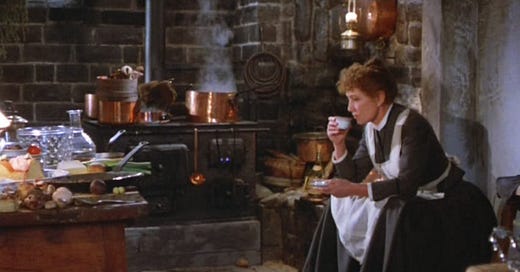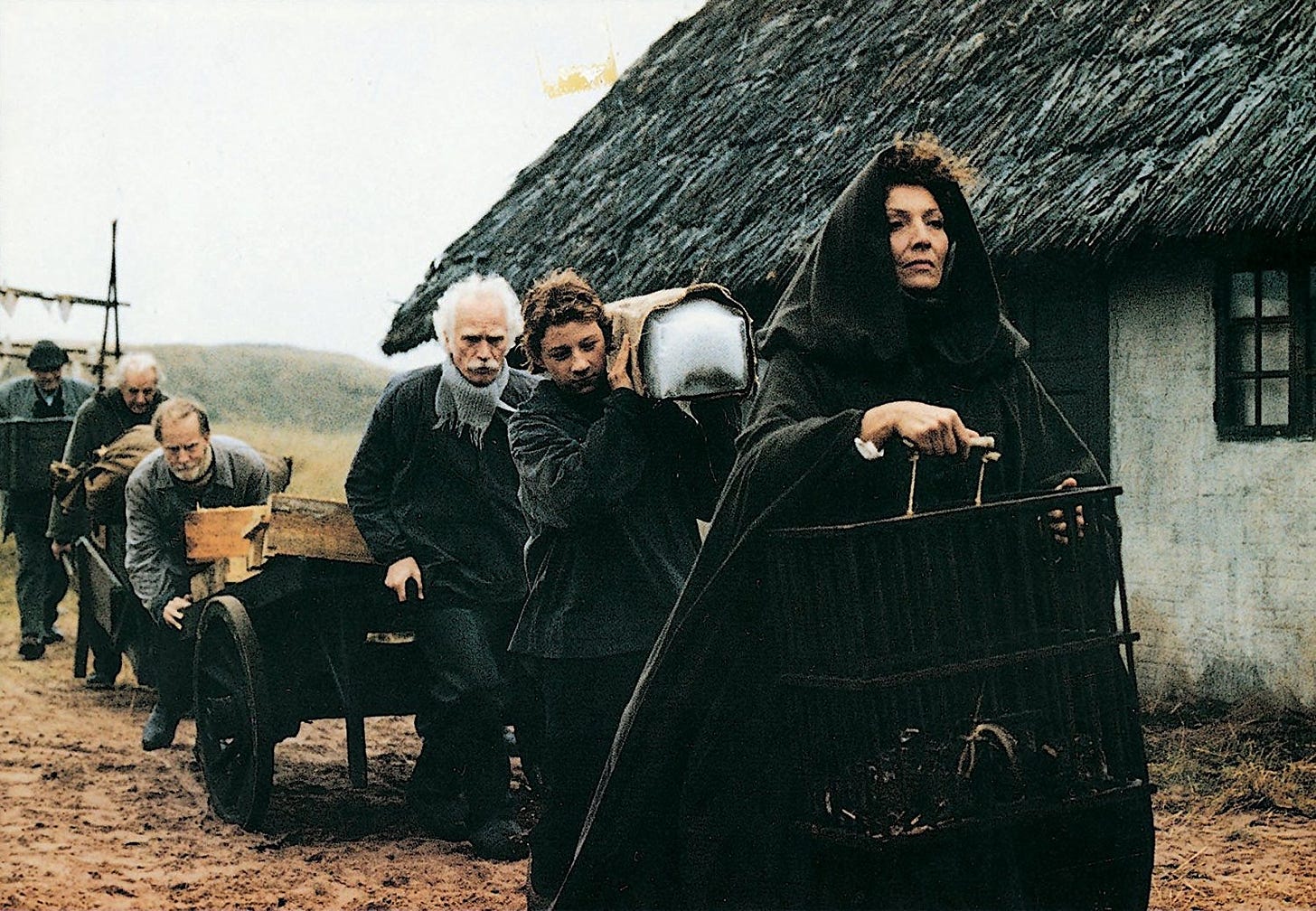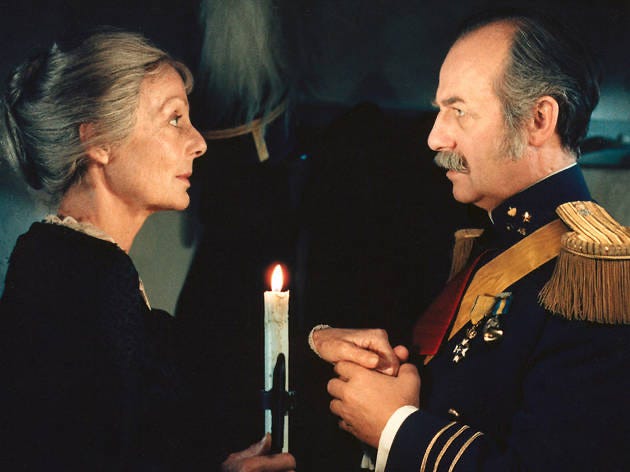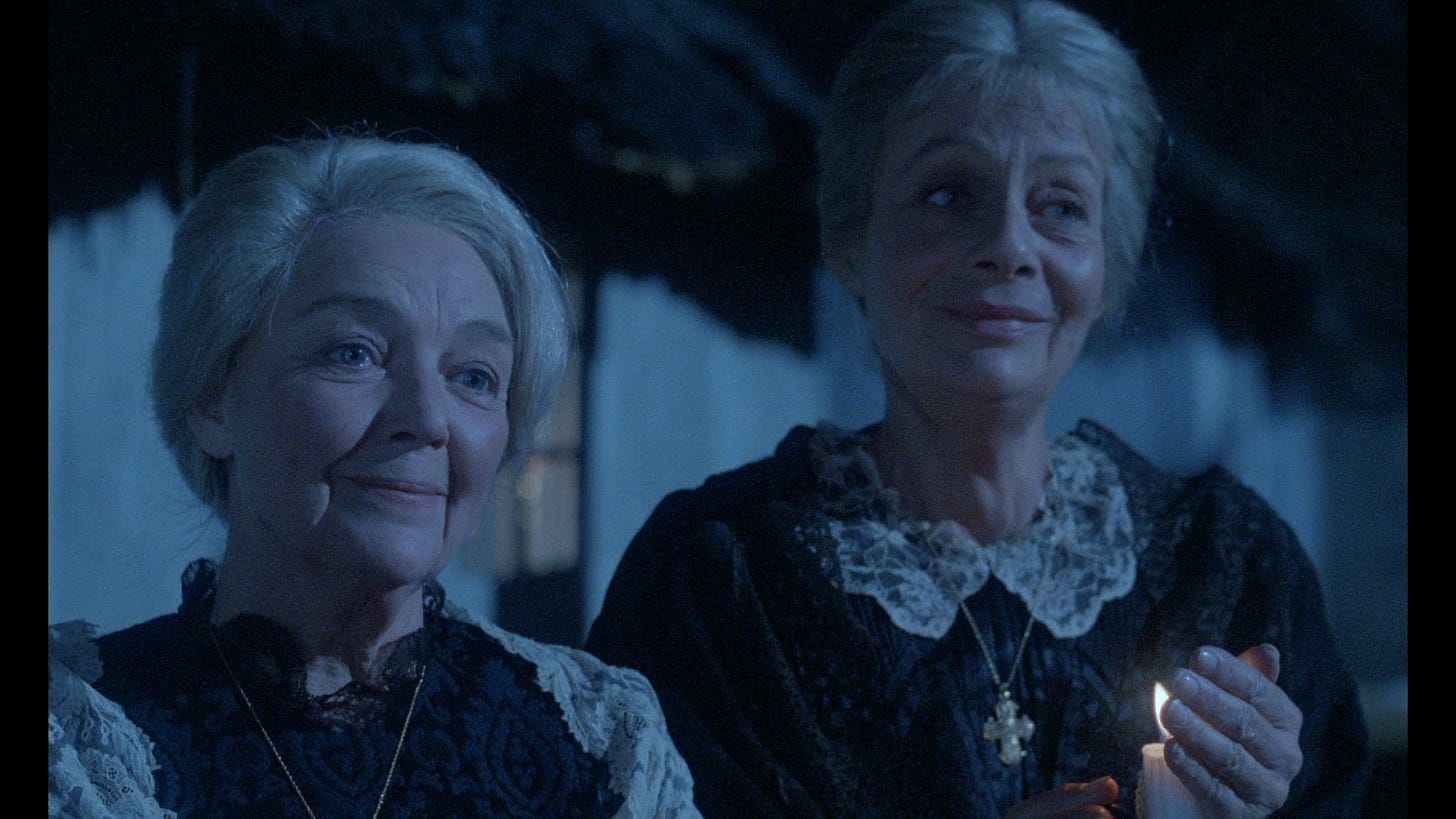Babette’s Feast (1987) + Seven Course French(ish) Dinner, pt. 2
Babette’s going to finish telling you about her favorite story while you eat.
This is Babette’s Book Club, where Babette talks about what she’s reading and watching lately.
Famously, the lunch special at Babette’s is always free—but tonight, to honor her paying customers, Babette is cooking supper. She's also going to tell us a story. (Continued from part one)
(Babette drinking after her labors. Look how she sits with her knees apart to rest her lower back. If you cook, then you know.)
(Look how clean that plate is! I told you the salad was something special. The secret is all the fresh herbs.
Main course is up, finally. Tuna croquettes with a Norwegian lemon butter sauce called sandefjordsmør, and fondant potatoes stuffed with herbed cream cheese.
Quick, someone call Martine and Phillipa to the table, tell 'em there's more stuff you can do with fish than boiling it to death.)
So, obviously, now that Babette has money and options, she's not going to be a housekeeper in a little fishing village anymore. At least, that's what Martine, Philippa, and everyone else in the village assumes. I don't know exactly what ten thousand francs in the 1870s works out to in today's money, but it was definitely enough for Babette to move out of the tiny room above Martine and Philippa's kitchen. Naturally everyone assumes this is what she’ll want to do.
One morning, after the news about the money comes in, Babette asks for a word with the sisters. They're bracing themselves, expecting a goodbye speech. Instead, she tells them that she wants to ask a favor. Their father's 100th birthday is coming up. He's long dead, but their little church is planning to have a fishbread soup birthday dinner in his honor. Babette wants to know if she can cook a special dinner at her own expense for the occasion. "A real French dinner", as she puts it.
Martine and Philippa panic a little. These ladies have been eating fishbread soup their entire lives. Plus, in the 1800s, French food made a lot of people panic. Like when you take your grandma out for sushi and she gets all nervous thinking she’s going to have to eat raw fish. The French were known for eating weird stuff: spices, snails, puppy dog tails, who knew what you’d find in a ragout. But Babette has been living with these people for twelve years now. She knows how they think and how to get around them. She points out that in all the years she's worked for them she's never asked for anything. The sisters have to agree, she's never asked for anything, including a salary. They have no choice but to let her cook for the party.
Babette announces that she must leave for a week to visit Paris to buy the things she needs for the dinner. In the mean time, Martine and Philippa have to take over the cooking again, which means that for a few days, everyone is once again eating fishbread soup: original colitis edition. (The movie provides a reaction shot of an old man eagerly opening his food basket, only to find himself dipping a spoon into the old familiar pre-Babette sludge. His fallen face is a story all by itself.)
(Babette’s triumphal procession.)
When Babette returns at the end of the week, it’s at the head of a tiny procession of things and people and animals. There’s a raft coming around by water with even more stuff. Martine, watching it all go by, lands her eye on a turtle the size of one of those Fisher Price sandboxes. Her eyes widen with horror. Cut to the sisters having a hushed secret meaning with the other members of their church. "I blame myself," Martine says. She's accepted an invitation on behalf of everyone to a witch's sabbath, and Lord only knows what horrors they’re going to have to choke down in the name of Babette’s feelings and French cuisine. The church members solemnly promise to take it as a penance. They're not going to embarrass the little sisters or Babette. Not a single word will cross their lips about the food. "It will be as if we have lost the sense of taste," they vow.
(Still working on those tuna cakes? Well, take your time. There's a reason fancy dinners last so long. Stomachs need time to catch up. And there's still dessert to get through, so you know. Pace yourself.)
Ten guests are invited to the birthday dinner: the same eight people who come to all the prayer + fishbread soup dinners, plus the rich old lady whose nephew Lorens fell in love with Martine all those years ago, plus Lorens himself, now a general in late middle age. (Add Martine and Philippa into the mix and you get twelve guests at Babette's last fancy supper. Symbolism!)
Time has gone by and Lorens has become a success. He's important, he has power and influence, and his wife is very fancy, but none of it means anything. The last time he was here it brushed the cobwebs out of his head. He gave up drinking and messing around and settled down to do his duty. But that's about the only kind of satisfaction it seems like he's had out of life. None of his accomplishments matter all that much to him. But as he's getting dressed for the party, we see that one thing does matter to him: seeing Martine again.
When Lorens arrives and sees the table grandly set for a formal dinner party, he hesitates for just a second. Clearly, this is a man who woke up expecting to eat fishbread soup for his dinner. What are they planning to do with all these plates?
The thing is, although he doesn't know about Babette, Babette is ready for him—at least, for a guest of his social standing and sophistication.
(Poor turtle.)
Everybody sitting at the table has their game face on when the soup is brought out. The eight church members are grim, resolute. Anticipating atrocities, they are ready to spoon down liquid brimstone without flinching. Lorens, anticipating fishbread soup and Pietist cooking, is clearly bracing himself to do the same. Then he eats a couple of spoonfuls. His eyebrows go up. "This is real turtle soup!" he exclaims. (Normal people were suspicious of French cooking, but fancy people in the 1800s loved their turtle-based cuisine.) When he looks around for everyone else's reactions, they blank him. Someone makes a remark about the weather. Someone else says something about the importance of the occasion, i.e., their old pastor’s birthday. "Like the wedding at Cana, the food is of no significance," says an old man who clearly forgot what that particular story is about.
When the entree comes out, Lorens can't contain himself anymore. It's blinis demidoff (tiny pancakes with sour cream and caviar), and the last time he had it was when he got taken out to dinner in Paris by some French generals. They ate at a famous restaurant in Paris called the Cafe Anglais. The unusual thing about this famous fancy restaurant was that the head chef was a woman, and the food was good enough to make a grown man cry. The French general, his host, had declared then that he would never fight over a woman for love—but he would fight for this woman and her food.
(Don’t go scraping the pattern off the plate, now. There's a cheese tray, black forest cherry cake, and coffee still to come.)
As the meal goes on, people start to loosen up. Wine is served with each course, which helps, but they’re not very drunk. These folks have been mortifying the flesh with fishbread soup their whole lives. Now they're finding out what good food can do for both body and soul when the best ingredients are prepared by a brilliant chef. But they're still under a solemn oath not to say a word about the food itself, so their giddy joy comes out in other ways. People smile quietly down at their plates. An old lady takes a sip of water and frowns, then reaches for another, bigger glass of wine, takes a sip, and smiles like a little kid at Christmas.
Everybody eats their fill of endive salad and cailles en sarcophage (sarcophagus quails, in English, which is just a fancy way of saying pot pie). Then a rum baba comes out for dessert, and Lorens can't contain himself anymore. He's been sitting at this table, in this house where he fell in love half a century ago, eating the best meal he's ever had in the last place he ever expected to eat a good meal. In other words, he's experiencing the nice stuff from his fancy life in the house of the woman he fell in love with because she was good instead of fancy. The decision he made years ago to leave Jutland and Martine behind because he couldn’t live the life of a Pietist in Jutland now seems like a foolish misunderstanding. Obviously, the joys of sophisticated existence can be found in Jutland, although Martine could not be found anywhere else. It’s the kind of realization that could make a lot of people bitter, but Lorens takes it differently.
Like a drunk guest at a wedding, he makes a slightly incomprehensible speech. Blixen’s story explains that Lorens made a big splash back at the Danish royal court after he returned from Jutland all those years ago, in part because the Danish queen was very pious, and had read a book of sermons written by Martine and Philippa’s dad. Lorens impressed her (and jump-started his career) by quoting theology and scripture from the old pastor’s dinner table. Now, making a speech for a very different audience, Lorens quotes the old man again—a line that comes up throughout the story, although it seems like he’s just now understood it for the first time. “Righteousness and bliss shall kiss one another,” he reminds the other guests.
"Everything we have chosen has been granted to us. And everything we rejected has also been granted. Yes, we even get back what we rejected. For mercy and truth are met together. And righteousness and bliss shall kiss one another."
None of them have had much righteousness lately. But the bliss induced by Babette’s feast has reminded them that they have the capacity to be better, warmer, more forgiving and more generous with each other. People find it easier to be good when they’re happy and well cared for. Babette preached a whole sermon without saying a word.
They adjourn to the sitting room for coffee and wine and cheese, and as they mingle, little miracles start happening all around the room. Philippa plays the piano and sings a hymn, her voice just as beautiful as ever. Two old men who have been arguing about who cheated who for twenty years laugh and bury the hatchet. Two women who used to be friends until they got old and miserable hug each other and forgive everything.
As Lorens takes his leave, he and Martine have a moment alone. He tells her that, in a way, he's been with her, here in this house, his whole life, and that he will still be here with her even when he leaves. He says, "in this beautiful world of ours, all things are possible", and Martine looks at him like he's making sense.
Finally, everybody files out of the house to go back to their own little houses nearby. Spontaneously, they all join hands in a circle around the well and sing a hymn. One old man hangs back after the song is done. He clasps his hands and looks up to the night sky and says, "Hallelujah!"
For just a second, while they're singing, we see a glimpse of Babette, sitting in the kitchen surrounded by dirty dishes, drinking her coffee. The singing reaches her there for a second, and she looks up and smiles.
So there Martine and Philippa are, in the wee hours of the morning, survivors of a witch’s sabbath turned communion feast. They rush back inside to find Babette, hardly knowing how to talk about the experience they just had but needing to convey their appreciation somehow. "It was a very nice dinner, Babette! Everyone really thought it was such a nice dinner." Their little faces glow with enthusiasm.
With the air of a general who stands victorious at the end of a long campaign, Babette says quietly, “I was once the head chef at the Cafe Anglais.” Just a few hours ago, Lorens had told them all about the Cafe Anglais and its famous female chef. Now we understand why the meal astonished him; he’d eaten it before.
Babette has never spoken of her past. In Blixen’s story, she tells them that in Paris, men like Lorens had been the only people with the experience to “appreciate me”, as she puts it. The revolt of 1870 had destroyed that world—but also, Babette helped destroy it. When her husband and son took to the barricades to fight the very general who once vowed to fight for Babette and her food, she was there next to them, loading the guns. That same general killed her son and husband, Babette tells them. Now she only has the sisters, and the community she helps them care for, and the home she’s made in exile.
The sisters, deeply moved by her story, can’t restrain their sadness anymore. They’re going to miss her so much when she leaves! “I am not going anywhere,” she tells them. Babette can’t leave Jutland; she no longer has any money. All ten thousand francs went to pay for the dinner party. She will stay here, with Martine and Phillipa. “But now you will always be poor!” they exclaim. “An artist is never poor,” Babette says, with perfect serenity.
In their restrained Lutheran way, the sisters are overflowing with emotion: joy, gratitude, deep affection. They were dreading Babette’s departure, but the scale of her sacrifice and all it implies moves them so profoundly they can barely speak. Philippa, M. Papin’s pupil who turned her back on the chance to become a famous singer, is the one who finds the proper words to acknowledge Babette’s gift to them. They are the same words M. Papin said to her when he heard her sing, years ago: “In heaven, how you will delight the angels!”
And then they go to bed to get some sleep before the day begins again.
Well. That’s the story. I like it better than just about any story I can think of, so I figured I’d start my book club off by talking about it.
I will say, though, that you don’t need to spend ten thousand francs to cook a meal so good it makes people rethink their whole life. You can’t do it with no money, but if you have the know-how you can do a lot with a little. Karen Blixen was a baroness. We all have our limitations.
Anyway, you don’t have to rush off. Sit awhile, finish your coffee. If you’ll just excuse me a moment, I need a tissue.
Actually, we sell those little rolls of Tums at the register. I’ll grab you one while I’m up there. On the house.









